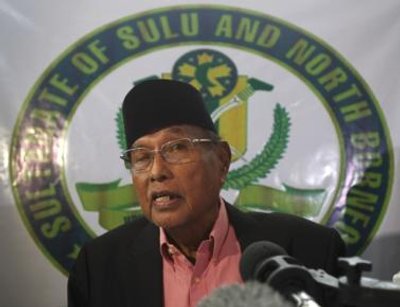Malaysia Feature: Why a Mini-Crisis with the "Sultanate of Sulu" Matters for the Nation and the World (Foley)
 "Sultan of Sulu" Jamalul Kiram IIIRegular EA contributor Sean Foley writes:
"Sultan of Sulu" Jamalul Kiram IIIRegular EA contributor Sean Foley writes:
For centuries, the Malaysian state of Sabah, located on the island of Borneo, has been known as “the land below the wind” --- a reference to its fortuitous position just south of the typhoon-prone region around the nearby Philippines.
But the geography that has shielded Sabah from Pacific storms for generations could not protect it on 11 February from more than 200 armed Muslim Filipinos --- the "Royal Security Forces of the Sultanate of Sulu", a Muslim monarchy which once governed Sabah and other adjoining territories from a base in the Philippines. The army publicly asserted its right to settle in Sabah, with the Sultan of Sulu ruling the province.
Because the men had training in guerrilla warfare and carried powerful M16 rifles and rocket- propelled grenades, there has been speculation that the Royal Security Forces are allied with armed Muslim groups in Mindanao who oppose the Philippines Government. The prospect arose that Sabah, with its 3.17 million people, had joined Mali as a new front in the ongoing "Global War on Terrorism".
Closer to home, the Royal Security Forces’ invasion presented difficult challenges for the Malaysian Government, with its counterpart in Manila at times ambivalent about the crisis and how it should be resolved. For the Malaysian Government, Sabah is crucial to its strategy for retaining ia majority in Parliament in elections which must take place by the end of June. That vote also international implications, with Malaysia serving as a positive example for states undergoing democratic transitions --- it has modernised its economy and society while adhering to Islamic principles.
That reputation in large part reflects the successes of the Malaysian governing party, the United Malays National Organization (UMNO), and its coalition partners in the Barisan Nasional (BN). Since independence in the 1950s, the coalition has maintained political stability while defeating a Communist insurgency, diversifying the nation’s economy, and addressing the disparity in wealth between Malays --- 2/3 of the population --- and Malaysians of Chinese ancestry, about a quarter of the populace. A decade after leaving office as Prime Minister, . Mahathir bin Mohamad --- or Bapa Pemodenan, the Father of Modernization --- remains one of the most popular and respected figures in the Muslim World.
However, these social and economic successes hide key challenges at home and abroad. Kuala Lumpur claims territory that falls within the zone of the South China Sea which Beijing sees as its sphere of influence. While Malaysia retains robust commercial ties with China, it has also sought stronger security and commercial ties with the US.
More than two decades after the end of the Cold War, the political structures that served as the foundation of Malaysian politics have started to fray. While UMNO retains a broad Malay base, its traditional Chinese partners have been challenged by parties like the Democratic Action Party (DAP), who channel unease within the community towards government policies that some see as favoring the Malays. The DAP has formed an opposition alliance, the Pakatan Rakyat (People’s Pact), with Malaysia’s Islamic party PAS and with the PKR --- the party led by Anwar Ibrahim, former Deputy Prime Minister Malaysia’s best-known politician among Westerners.
In the last general election in 2008, the ruling coalition failed to win a two-thirds super-majority, needed to enact constitutional changes. The opposition People's Pact also won control of five State governments, including the two wealthiest: Penang and Selangor. The coalition held on to national power by winning most of the seats in Malaysia’s two largest states, Sarawak and Sabah.
Almost five years later, Malaysia’s electoral politics look to be competitive again, with Sabah likely to play a significant role again --- "“the frontline battleground" in the words of UMNO political leader and Assembly Speaker Salleh Said Keruak.
The "invasion" of Sabah in February 2013 fused that political battleground with Malaysia's importance in and beyond the region. Buttressing its claim to be an economic model, the country has long-standing ties in business, education, and tourism with Iran and the Middle East. Kuala Lumpur has sought to play a positive role in the Arab-Israeli peace process and provides humanitarian assistance to the Palestinians. In January 2013, Malaysian Prime Minister Najib Tun Razak became the first non-Arab head of government to visit the Gaza Strip as an official guest of Hamas.
The Malaysian Government will now try to make use of those links to rebuff not only the "Royal Security Forces of the Sultanate of Sulu" but the Philippines. Manila's officials have recently indicated that they are considering returning to international courts to establish their claim to Sabah, which has oil and gas fields, profitable palm oil plantations, and new Chinese investments in hydroelectric power and coal.
The Malaysian Government responded to the violence of the "Royal Security Forces", after the beheading of a policeman, with the deployment of armed forces and aerial bombardment. That response was backed by the Malaysian public.
Whether the military operation against the “Royal Security Forces” is a long-term resolution remains to be seen. Defeating 200 armed Muslim invaders with modern national armed forces is one matter. Reaching a political consensus among Malaysia’s various communities while sustaining Malaysia’s international position is another. Nonetheless, Malaysians have overcome more significant national challenges than the one they face in 2013.

 Wednesday, March 13, 2013 at 7:51
Wednesday, March 13, 2013 at 7:51
Reader Comments